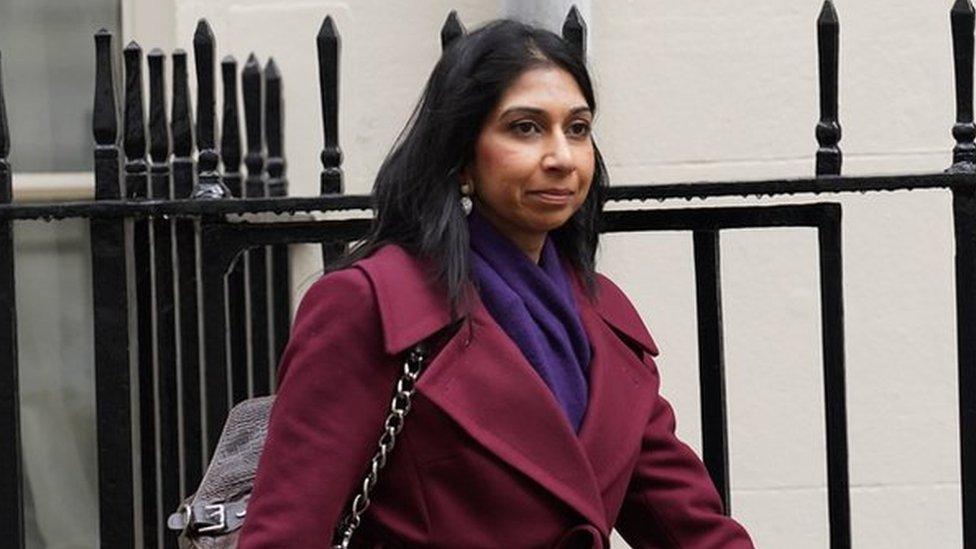Rwanda flights: Could next step harm Good Friday Agreement?
- Published
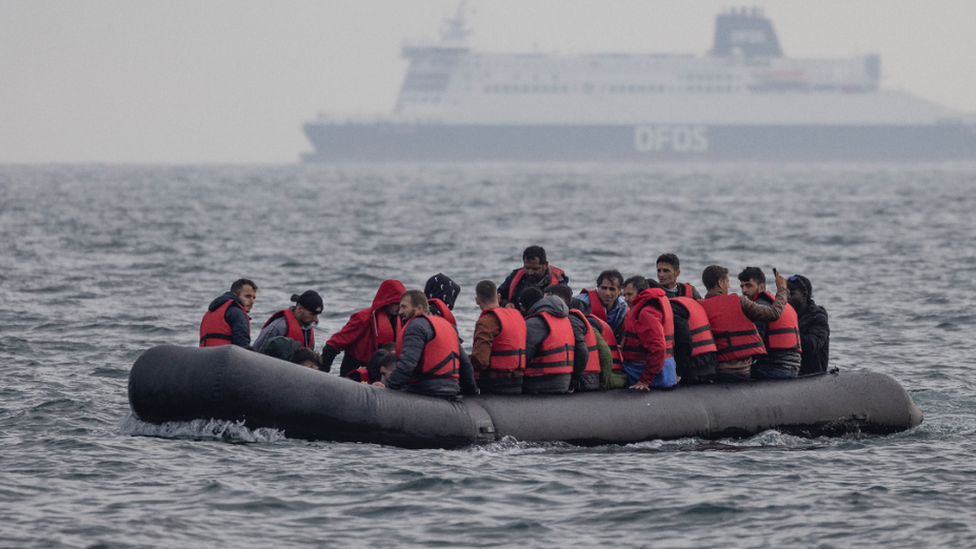
The Rwanda plan aims to deter people from crossing the Channel in small boats
This week the highest court in the UK ruled the government's Rwanda asylum policy was unlawful, saying it would break international and human rights laws.
This prompted calls from some Conservative MPs for the UK to leave a long-standing human rights treaty, in order to follow through on the prime minister's pledge.
But there has been criticism that doing so would breach the Good Friday Agreement, which helped set up power-sharing government in Northern Ireland.
BBC News NI explains the key questions and some of the arguments in play.
What is the European Convention on Human Rights?
It is an international treaty to protect human rights and political freedoms.
It was created in the 1950s by a number of countries including the UK, and sets out the rights and freedoms people are entitled to in the 46 signatory countries.
It means the UK is legally committed to abide by certain standards of behaviour, as well as protect the rule of law and promote democracy.
The convention is overseen by the European Court of Human Rights.
It is separate to the European Union - so the UK remained part of both after Brexit.
Why do some politicians want the UK to opt out of it?
There is growing division within the Conservative Party about how Rishi Sunak should deliver on his promise to halt migrant crossings into the UK.
On Wednesday, the Supreme Court said there was a risk of Rwanda returning genuine asylum seekers to countries they had fled from, as it breaches part of the ECHR, which prohibits torture and inhuman treatment.
The judges said the policy also breached safeguards in three British laws passed by Parliament over the last 30 years and referred to a number of different United Nations conventions.
Some senior Tories have since expressed frustration at the ruling.
Former Home Secretary Suella Braverman has repeatedly criticised the role of the ECHR.
On Thursday, she said ministers should ignore human rights laws and obligations in their "entirety" to follow through on the plan.
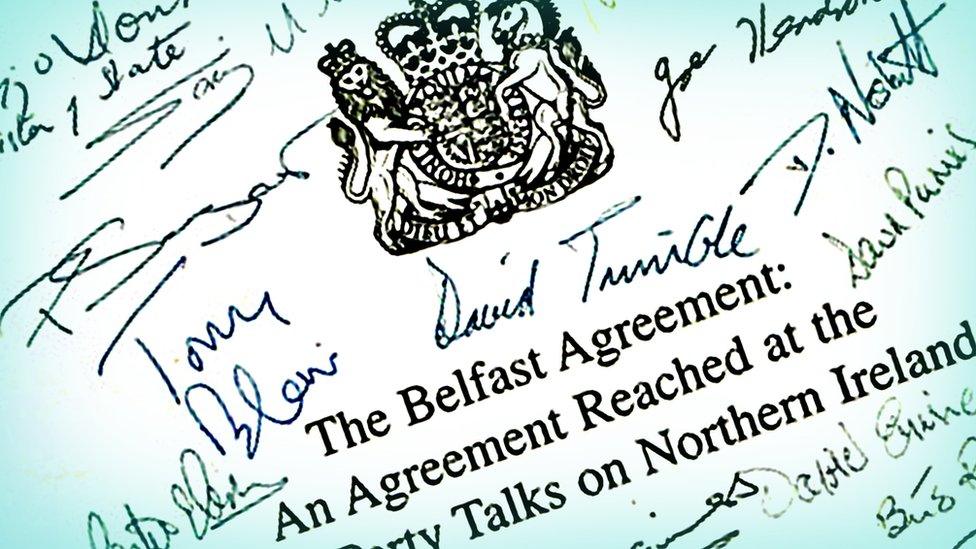
The Good Friday Agreement established the current system of government in Northern Ireland
What does the Good Friday Agreement have to do with this?
Large parts of the deal, which helped forge peace in Northern Ireland, ending decades of conflict known as the Troubles, are underpinned by the ECHR.
In section six of the agreement, external, the British government pledged to incorporate the European Convention on Human Rights into Northern Ireland law.
It spells out that this would include "direct access to the courts, and remedies for breach of the Convention, including power for the courts to overrule Assembly legislation".
It also included the creation of a Human Rights Commission for Northern Ireland, to further protect the "principles of mutual respect for the identity and ethos of both communities".
Essentially, incorporating the ECHR into the agreement was deemed an extra way to ensure the rights of citizens beyond Stormont and Westminster.
Alliance MP Stephen Farry said it was all about "inclusion".
"There'd been a history of contention in Northern Ireland about rights abuses and issues, so it was very important people understood that all their rights would be protected and they would have ready-made access."
Concerns have been raised by some political parties that leaving the ECHR would breach the Good Friday Agreement.
Human rights campaigners also argue that it would affect how individuals can hold the state to account in Northern Ireland on many rights issues.
Could the UK exit the ECHR?
The government's official position for some time has been that the UK will remain in the ECHR.
But outlining his plan for emergency legislation to enact the Rwanda asylum policy, the prime minister said he would "do what is necessary" to push it through, to prevent the European Court of Human Rights from blocking flights from taking off.
Some have interpreted that as a sign the government could opt to leave the convention, and other cabinet ministers have previously not ruled it out either.
Asked about the possibility Northern Ireland Secretary Chris Heaton-Harris this week said that "everybody in government knows how important" the ECHR is to the Good Friday Agreement.
However, he added: "I think there's a place for the ECHR to be reformed, but we need to work with other governments to do it."
What's been the reaction?
The issue has ignited a debate within the Conservative Party.
Former Lord Chancellor Sir Robert Buckland told BBC News NI that the government needs to "resist the siren voices" within the party.
And he criticised some colleagues for overlooking the potential impact on Northern Ireland of leaving the ECHR.
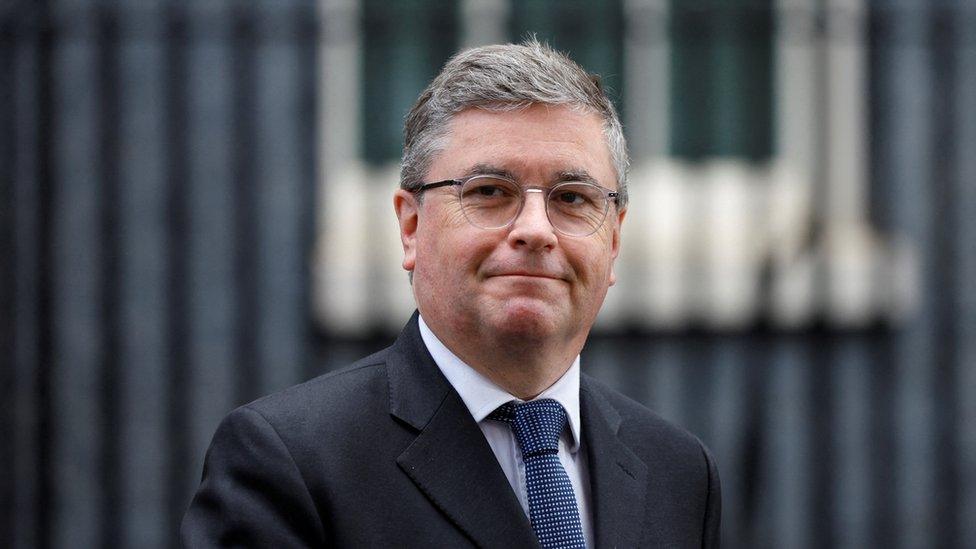
Sir Robert Buckland is a member of the Northern Ireland Affairs Committee at Westminster
"This dimension always seems to be missed - they have to acknowledge the full potential impact on the peace process at a time we don't have functioning institutions at Stormont, if anything we need to be doubling down on our commitments," he added.
"Everybody shares the frustration on the small boats issue, but let's step back and address this in a practical way."
Has there been controversy about the ECHR before?
Yes.
Last year, the government was criticised after it proposed a new UK Bill of Rights, which would repeal the Human Rights Act.
The Human Rights Act incorporates the ECHR into legislation covering Northern Ireland.
The intention of the Bill of Rights was to reduce the influence of the ECHR over laws in the UK and had been championed by Dominic Raab when he was justice secretary, but was later abandoned after Liz Truss became prime minister.
Former Northern Ireland Secretary Julian Smith welcomed the decision to shelve the plan, saying it would have been "regressive" for Northern Ireland.
As for its latest Rwanda asylum policy, Number 10 appears determined to press ahead, but like with some of its previous Northern Ireland plans it could end up in a big legal and political battle.
Related topics
- Published9 August 2023

- Published3 April 2023
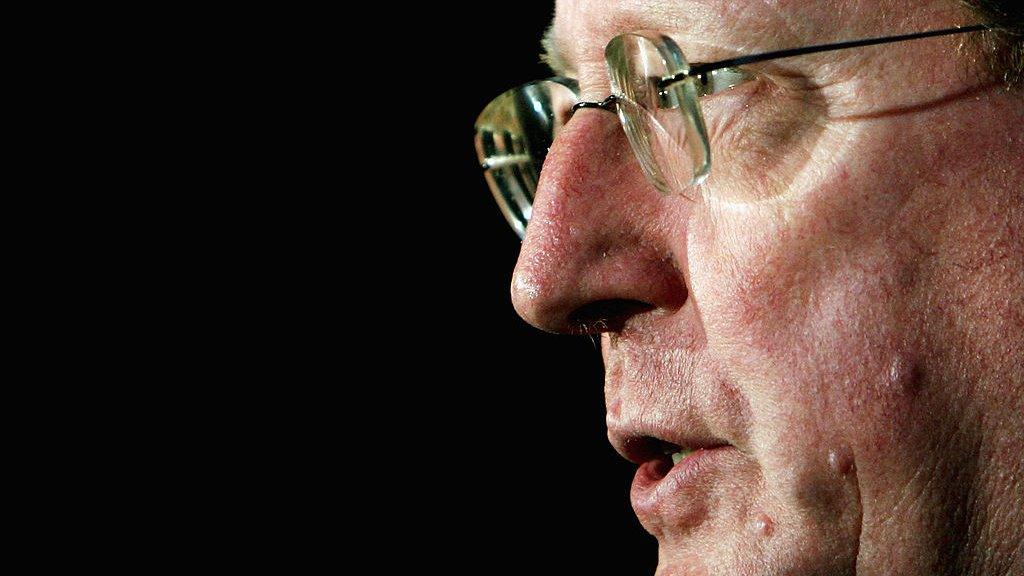
- Published10 March 2023
